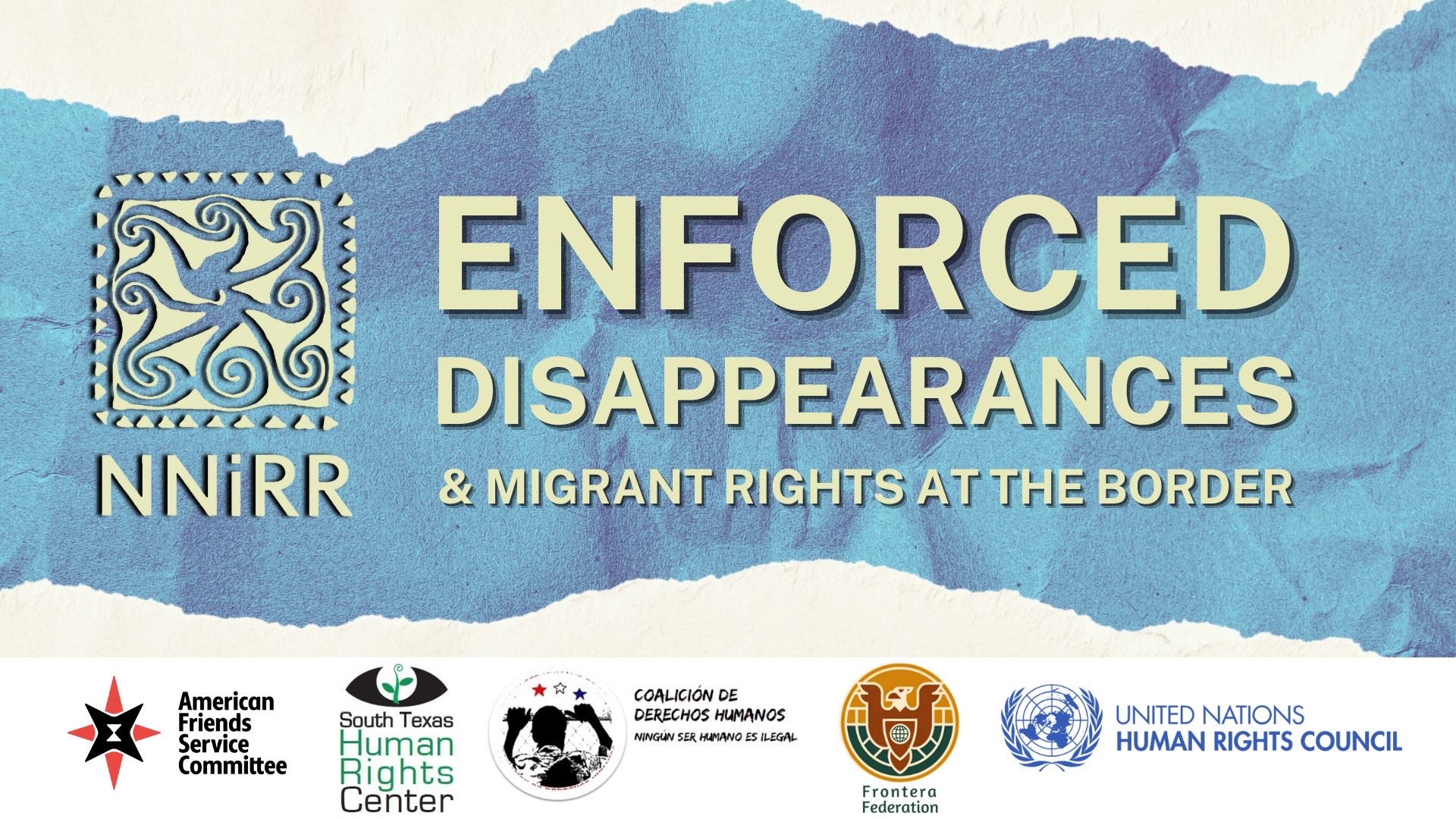 | | | | | |  | | | | | Enforced Disappearances in the Context of the U.S.–Mexico Border | | | | Dear John, The National Network for Immigrant and Refugee Rights (NNIRR) joined partners on June 6 to convene the workshop, “Enforced Disappearances and Migrant Deaths in the U.S.-Mexico Borderlands.” The event brought together more than 30 participants—grassroots organizers, legal advocates, forensic experts , and scholars–to confront the growing human rights and humanitarian crisis of missing and deceased migrants on the borderlands. Convening partners included the United Nations Working Group on Enforced or Involuntary Disappearances, the American Friends Service Committee, Coalición de Derechos Humanos, Frontera Federation, and the South Texas Human Rights Center. The U.S.-Mexico border has become the world’s deadliest land migration corridor in the world. Each year, hundreds of migrants die or go missing—and many cases go unreported due to systemic gaps and institutional neglect. These tragedies stem from multiple systemic failures, including: - lack of legal migration pathways
- ineffective or negligent search and rescue operations
- disjointed agency coordination
- discriminatory border enforcement policies that force migrants into dangerous terrain
- Search and rescue operations are led by the very agencies tasked with immigration enforcement—undermining transparency, accountability, and life-saving intervention.
The humanitarian toll is profound, leaving families desperate for answers. Organizations working to identify remains and reunite families are overwhelmed, underscoring the urgent need for collective action. | | Workshop Overview: Addressing the Crisis Through a Human Rights Lens | | | | In this first workshop of a planned series, NNIRR and partners brought together specialized human rights organizations and academics to deepen our collective analysis, strengthen documentation strategies, and explore how legal definitions of an enforced disappearance can advance a shared demands: to end deadly border policies, locate the missing, and reunify remains with their families. Ana Lorena Delgadillo, a distinguished Mexican human rights lawyer and current member of the UN Working Group on Enforced or Involuntary Disappearances, provided a compelling legal framework. She addressed how gaps in search efforts, challenges in identifying remains, and other systemic factors could constitute enforced disappearances. Key questions included: - What defines an enforced disappearance in the context of human mobility at the border?
- How does state complicity, whether active or through neglect, fit within international human rights law?
- What tools exist for accountability, and where are they failing?
In the dialogue session, participants shared lived experiences and identified recurring patterns of state negligence, violence, and impunity. Identifying such cases that could meet legal definitions of “enforced disappearances” are critical for addressing the violence and impunity that has characterized migration, and in particular, border policies. The discussion closed on next steps and strategies to advance justice and accountability, including: - Using academic research to support community-based advocacy;
- Strengthening forensic and legal tools to document and challenge state responsibility;
- Building cross-border solidarity networks for international pressure and change.
Upcoming events in this series will include community webinars aimed at advancing human rights approaches to migration and border governance. | | Holding the U.S. Accountable: Enforced Disappearances and Third Country Agreements | | As venues for civic engagement and political accountability have narrowed in the U.S, NNIRR joined 26 other U.S- based organizations, such as ACLU, Immigrant Rights Defenders, and the Hope Border Institute, to prepare a joint submission to the United Nations special procedures regarding the arbitrary detention and enforced disappearance of migrants in the U.S. The report on ongoing human rights violations and call for international scrutiny and accountability. It urges immediate protective measures for individuals who have been forcibly disappeared or transferred to third countries, while also denouncing patterns of state negligence and impunity. In a separate submission to the UN Special Rapporteur, NNIRR and six partner organizations, including HIAS and Oxfam, highlighted the serious harm and lack of due process resulting from the U.S. government's efforts to remove individuals to third countries. Many people seeking protection in the U.S. have been placed at significant risk of persecution and harm, often with limited or no access to permanent status or safety in these receiving countries. [Click here to learn more about these efforts.] Sincerely, The NNIRR Team | | | | | | | | Every contribution makes a difference. We are deeply grateful for your solidarity and partnership. | | | | Your contributions support NNIRR to: Advocate for immigration policy that centers human rights Lift up grassroots leadership, organizing, and advocacy Spotlight human rights organizing at the US-Mexico border Advocate for international migrant rights & human rights at borders Organize at the intersections of gender, climate justice, and migrant rights | | | | | | | | National Network for Immigrant and Refugee Rights (NNIRR) 310 8th ST, Suite #310 Oakland, CA 94607 Oakland, CA | El Paso, TX | [email protected] | nnirr.org | | | | | | | | | |